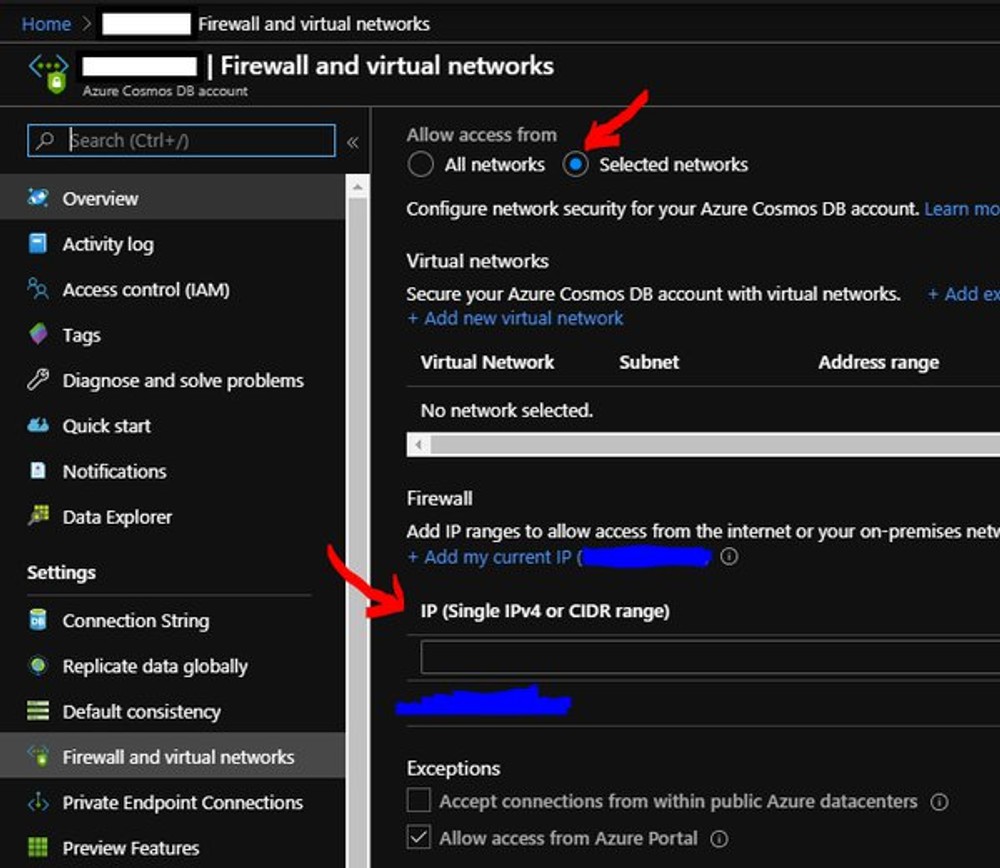MongoNetworkError: failed to connect to server [yourdb.mongo.cosmos.azure.com:10255] on first connect
My first attempt to access the Azure Cosmos DB from my localhost resulted in the error below, and it took me some time to figure out that it is the firewall.
MongoNetworkError: failed to connect to server [yourdb.mongo.cosmos.azure.com:10255] on first connect [MongoNetworkError: connection 0 to yourdb.mongo.cosmos.azure.com:10255 closed
at TLSSocket.<anonymous> (C:\Projects\yourdb\nodeapp\node_modules\mongodb\lib\core\connection\connection.js:372:9)
at Object.onceWrapper (events.js:300:26)
at TLSSocket.emit (events.js:210:5)
at net.js:659:12
at TCP.done (_tls_wrap.js:481:7) {
name: 'MongoNetworkError',
[Symbol(mongoErrorContextSymbol)]: {}
}]
at Pool.<anonymous> (C:\Projects\yourdb\nodeapp\node_modules\mongodb\lib\core\topologies\server.js:438:11)
at Pool.emit (events.js:210:5)
at C:\Projects\yourdb\nodeapp\node_modules\mongodb\lib\core\connection\pool.js:561:14
at C:\Projects\yourdb\nodeapp\node_modules\mongodb\lib\core\connection\pool.js:994:11
at callback (C:\Projects\yourdb\nodeapp\node_modules\mongodb\lib\core\connection\connect.js:97:5)
at C:\Projects\yourdb\nodeapp\node_modules\mongodb\lib\core\connection\connect.js:124:7
at _callback (C:\Projects\yourdb\nodeapp\node_modules\mongodb\lib\core\connection\connect.js:349:5)
at Connection.errorHandler (C:\Projects\yourdb\nodeapp\node_modules\mongodb\lib\core\connection\connect.js:365:5)
at Object.onceWrapper (events.js:300:26)
at Connection.emit (events.js:210:5)
at TLSSocket.<anonymous> (C:\Projects\yourdb\nodeapp\node_modules\mongodb\lib\core\connection\connection.js:370:12)
at Object.onceWrapper (events.js:300:26)
at TLSSocket.emit (events.js:210:5)
at net.js:659:12
at TCP.done (_tls_wrap.js:481:7) {
name: 'MongoNetworkError',
[Symbol(mongoErrorContextSymbol)]: {}
}
MongoNetworkError, AuthenticationFailed with 'Invalid key,' was the first caveat I have faced.
The 'Invalid key' is an issue with the connection string issue. If I open the Azure portal, then go to the Cosmos DB instance, then go to the Quick Start section and select Node.js on choose platform, then I will see two ways of specifying the secret (or the password). What worked for me with Mongoose == 5.9.5 was the string that is not encoded i.e., Node.js 2.2 driver example.
MongoNetworkError: failed to connect to server [yourdb.mongo.cosmos.azure.com:10255] on first connect [MongoError: Invalid key
at C:\Projects\yourdb\nodeapp\node_modules\mongodb\lib\core\auth\auth_provider.js:46:25
at C:\Projects\yourdb\nodeapp\node_modules\mongodb\lib\core\auth\scram.js:240:11
at _callback (C:\Projects\yourdb\nodeapp\node_modules\mongodb\lib\core\connection\connect.js:349:5)
at Connection.messageHandler (C:\Projects\yourdb\nodeapp\node_modules\mongodb\lib\core\connection\connect.js:378:5)
at Connection.emit (events.js:210:5)
at processMessage (C:\Projects\yourdb\nodeapp\node_modules\mongodb\lib\core\connection\connection.js:384:10)
at TLSSocket.<anonymous> (C:\Projects\yourdb\nodeapp\node_modules\mongodb\lib\core\connection\connection.js:553:15)
at TLSSocket.emit (events.js:210:5)
at addChunk (_stream_readable.js:309:12)
at readableAddChunk (_stream_readable.js:290:11)
at TLSSocket.Readable.push (_stream_readable.js:224:10)
at TLSWrap.onStreamRead (internal/stream_base_commons.js:182:23) {
ok: 0,
errmsg: 'Invalid key',
code: 18,
codeName: 'AuthenticationFailed',
name: 'MongoError',
[Symbol(mongoErrorContextSymbol)]: {}
}]
MongooseError, [MongooseServerSelectionError]: connection to 255.255.255.255:10255 closed
This look has to do with the use of UnifiedTopology. This property has to be set to true to allow Mongoose to discover the database, I guess. I think that setting the property to true sorted that error for me.
MongooseError [MongooseServerSelectionError]: connection <monitor> to 255.255.255.255:10255 closed
at new MongooseServerSelectionError (C:\Projects\yourdb\nodeapp\node_modules\mongoose\lib\error\serverSelection.js:22:11)
at NativeConnection.Connection.openUri (C:\Projects\yourdb\nodeapp\node_modules\mongoose\lib\connection.js:823:32)
at Mongoose.connect (C:\Projects\yourdb\nodeapp\node_modules\mongoose\lib\index.js:333:15)
at Object.<anonymous> (C:\Projects\yourdb\nodeapp\app.js:21:10)
at Module._compile (internal/modules/cjs/loader.js:959:30)
at Object.Module._extensions..js (internal/modules/cjs/loader.js:995:10)
at Module.load (internal/modules/cjs/loader.js:815:32)
at Function.Module._load (internal/modules/cjs/loader.js:727:14)
at Module.require (internal/modules/cjs/loader.js:852:19)
at require (internal/modules/cjs/helpers.js:74:18)
at Object.<anonymous> (C:\Projects\yourdb\nodeapp\bin\www:7:11)
at Module._compile (internal/modules/cjs/loader.js:959:30)
at Object.Module._extensions..js (internal/modules/cjs/loader.js:995:10)
at Module.load (internal/modules/cjs/loader.js:815:32)
at Function.Module._load (internal/modules/cjs/loader.js:727:14)
at Function.Module.runMain (internal/modules/cjs/loader.js:1047:10) {
message: 'connection <monitor> to 104.45.144.73:10255 closed',
name: 'MongooseServerSelectionError',
reason: TopologyDescription {
type: 'Single',
setName: null,
maxSetVersion: null,
maxElectionId: null,
servers: Map {
'yourdbprod.mongo.cosmos.azure.com:10255' => [ServerDescription]
},
stale: false,
compatible: true,
compatibilityError: null,
logicalSessionTimeoutMinutes: null,
heartbeatFrequencyMS: 10000,
localThresholdMS: 15,
commonWireVersion: null
},
[Symbol(mongoErrorContextSymbol)]: {}
}
Another caveat is that I manually created the database
If you experience issues connecting to your database, this is something you can do in advance. Because the connection string requires your database to be presend, I am not sure how it will behave if you do not have one pre-provisioned.


